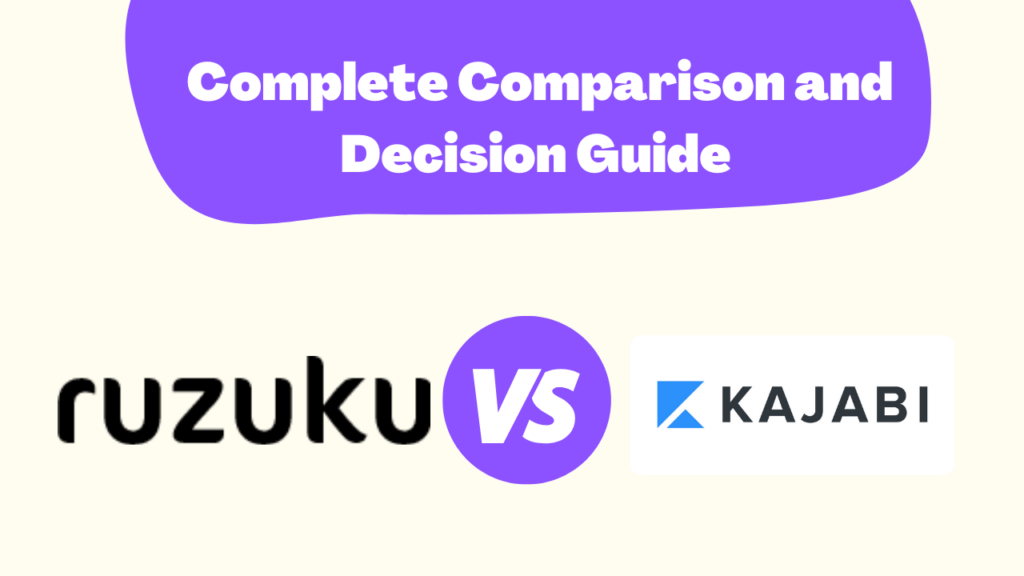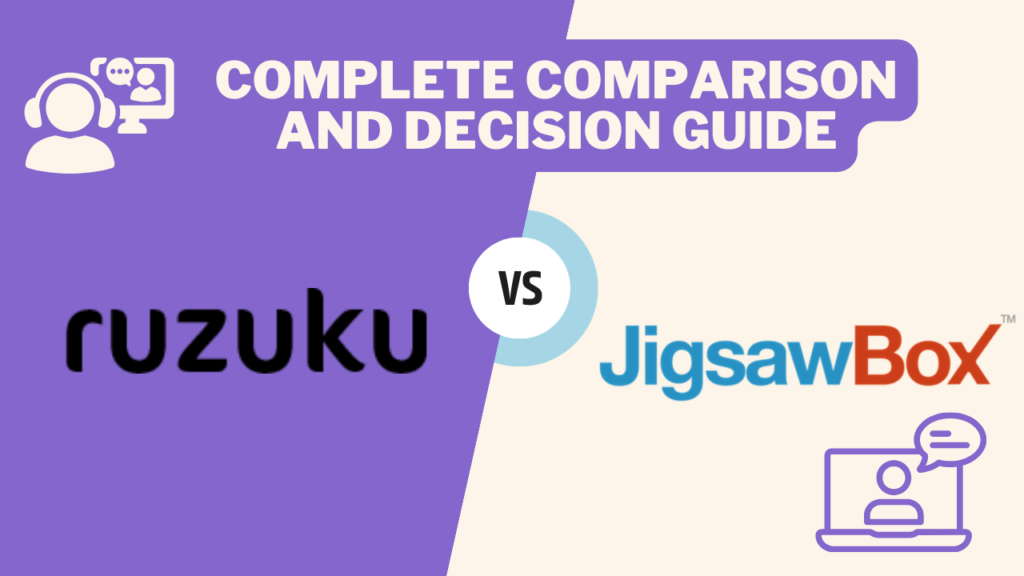
What’s in this Guide:
- Intro to Kajabi
- Intro to Ruzuku
- Feature breakdown
- Step-by-step decision guide
- Detailed visual checklist
Ruzuku and Kajabi are two options for coaches, authors, bloggers, speakers and other independent experts who are creating online courses.
Kajabi is a marketing and content delivery platform that is hosted for you at kajabiapp.com. Kajabi was founded in 2010 by Kenny Rueter and Travis Rosser.
Ruzuku is a course platform that is hosted for you at ruzuku.com. Ruzuku was designed by user experience consultants Rick Cecil and Abe Crystal, Ph.D., and launched in 2011.
Let’s take a look at the similarities and differences between the two platforms.
Last updated: December 20, 2017

Who is Kajabi for? Who uses it?
Kajabi is designed to help information marketers sell online programs. According to the Kajabi website, you can “use Kajabi to easily sell your content online.”
You can use Kajabi as part of your online marketing. For example, you can use it to create the pages and functionality that support a product launch sequence (such as landing pages and launch funnel pages.)
Kajabi also allows you to structure and post the content of your online program (such as videos, audio recordings, articles, and downloadable files.)
Kajabi is commonly used by experts who specialize in internet marketing, blogging, and business creation, among other areas.

Who is Ruzuku for? Who uses it?
Ruzuku is designed to support online courses or group programs in which many people go through a structured, step-by-step program together.
For example, a blogger who has written popular posts about using LinkedIn to find new career opportunities might create a 6-week course on “Using LinkedIn to Take Your Career to the Next Level.”
Here’s an example of an online course hosted on Ruzuku: 5 Steps to Your Online Course
[This self-study course is free, and you can register to see a live example of how the ruzuku platform can be used in practice].
Ruzuku is commonly used by experts and companies who offer courses in the areas of art & design, crafts, health, creative business, personal development, and professional skills, among other areas.
Course platform capabilities
When considering any online course platform, you’ll want to examine several factors:
- Ease of setup and ease of use
- Registration and Payment
- Scheduling and Content Delivery
- Audio and Video: Hosting & Streaming Content
- Learning Community and Discussion Forum
- Progress Tracking
- Live Calls or Webinars with Recording
We’ll go over each of these areas in more detail.
Ease of Initial Setup & Use
A key factor in moving forward with your online course is ease of use — how easy it is to set up and manage your online program?
Kajabi emphasizes ease of use for people who want to “turn content into a product.” Their website states, “Kajabi contains all the features you need to sell, market and deliver your content..”
Ruzuku focuses on ease of use for structured online courses. You set up your first course by registering for a trial account on ruzuku.com, then clicking the “Create a new course” button.
Registration and Payment
Both Ruzuku and Kajabi enable you to set a price for your online program and charge for access.
However, the platforms focus on different registration models.
Kajabi focuses on registering people into a “product,” which contains content such as videos.
Ruzuku focuses on registering people into a course. For example, a career coach might create a 6-week course for $499. The course would combine videos, worksheets, and group coaching calls. She might run this course several times throughout the year. Ruzuku would handle registration and payment for people signing up for specific sessions of this course.
For either platform, payment flows through a payment processor or shopping cart of your choice.
Both Ruzuku and Kajabi support Stripe as a payment processor. In addition, Ruzuku also integrates with PayPal.
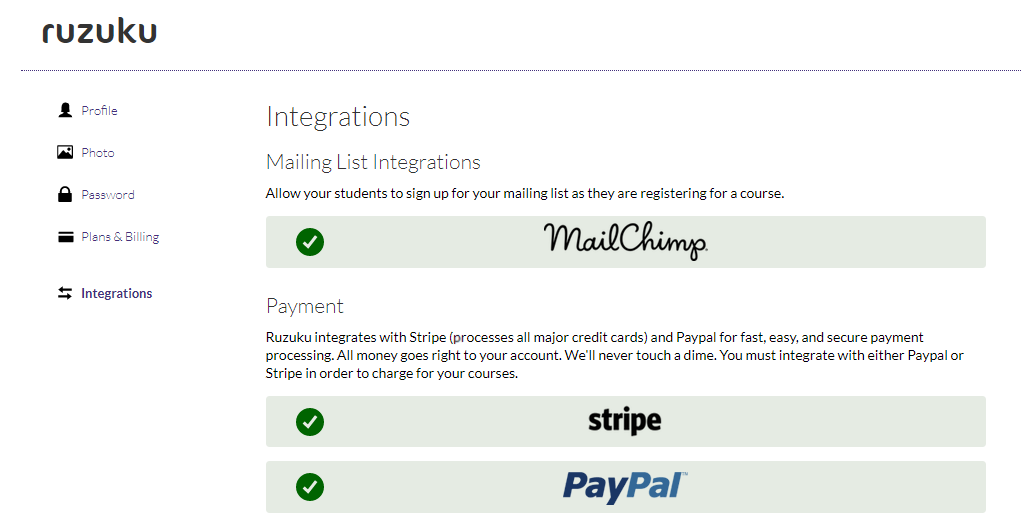
Scheduling and Content Delivery
Kajabi offers both “immediately available” and “drip” content, which is released over time based on when a participant signs up.
For example, a new participant might get immediate access to a certain set of resources upon signing up, and then receive new content 30 days later, and so on.
However, this ability to release content on a schedule must be defined in terms of a specific number of days after signup. This can make it very challenging to plan out a scheduled course — for example, an 8-week program with 12 different components, each to be released on different dates.
Ruzuku is designed to host both “scheduled” and evergreen courses.
A scheduled course starts on a specific date and allows a cohort of participants to go through the course together, on the same schedule. This model facilitates peer-to-peer learning and community for “live” courses and group coaching programs.
Ruzuku’s visual outline tool makes it straightforward to plan out your course, and choose the dates on which lessons are released.

The same visual outline can also be used to structure evergreen courses, as well.
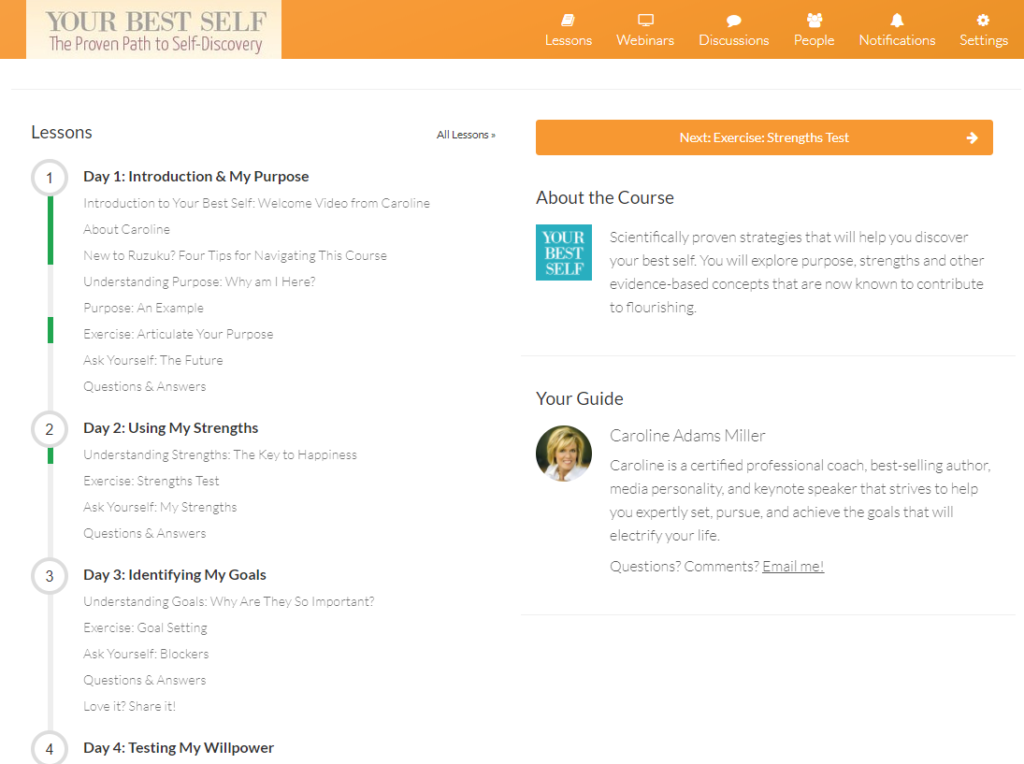
Audio and Video: Hosting & Streaming Content
Both Kajabi and Ruzuku includes professional audio and video hosting service as part of its course delivery platform, at no additional cost.
You can upload unlimited audio and video files directly to either platform. You also have the option to embed videos from 3rd-party services.

You can upload unlimited audio and video files directly to the Ruzuku online course platform. You also have the option to embed videos from 3rd-party services.
All of Ruzuku’s plans include a global Content Delivery Network (CDN), to support students around the world.
Learning Community and Discussion Forum
Ruzuku is designed around the importance of community and peer-to-peer support in online courses.
Participants have profiles with their name, a short biography, and a photo. As they participate in the course, a “learning journal” of all their work is automatically created:
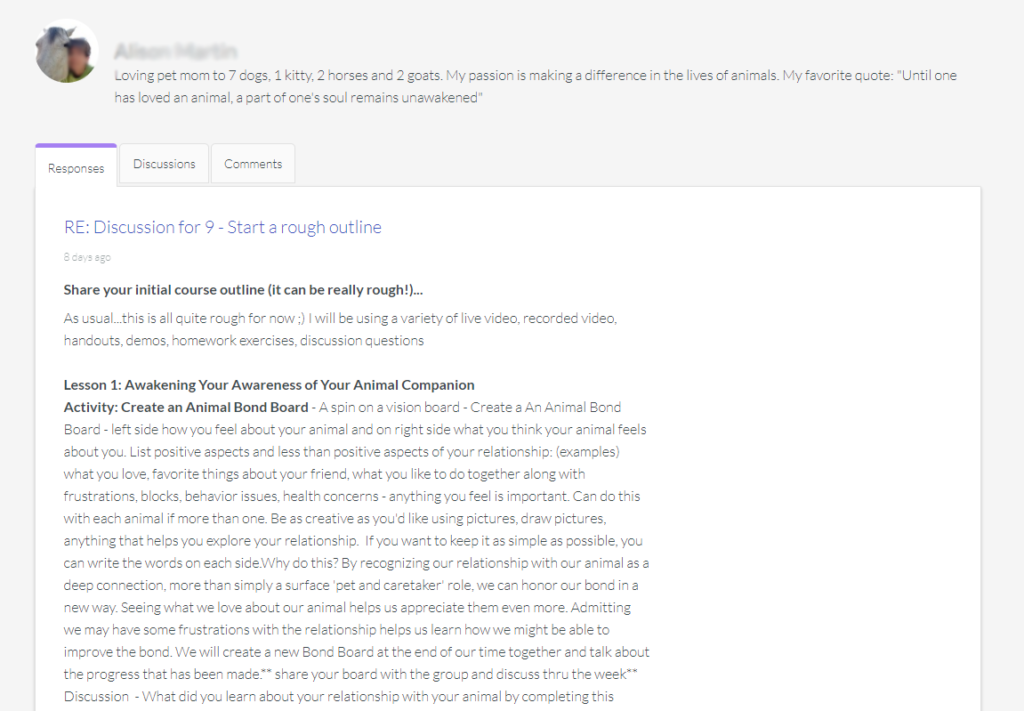
The Ruzuku online course platform provides integrated discussion forums for each lesson, as well as optional discussion prompts for specific activities. You can pose questions — and give students a space to reflect and share as they move through the course.
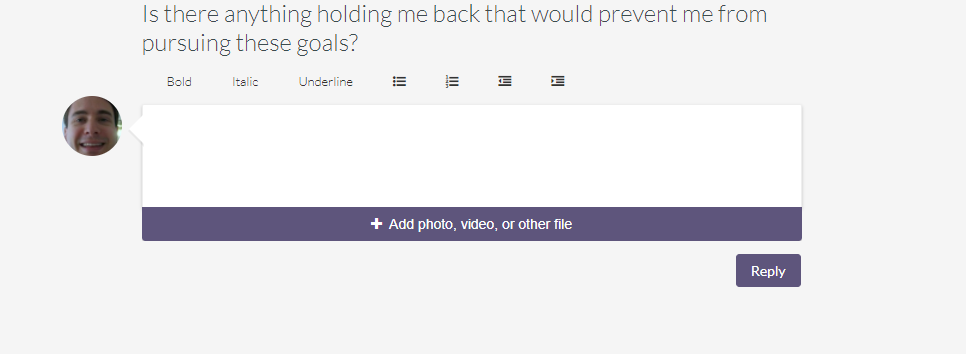
Participants can respond with both text comments, as well as documents, images, or even videos. For example, in an art course, a participant could upload a photo of one of her artworks to share with the community:

The “Notifications” stream makes it easy to see what others are posting and contributing in the course:
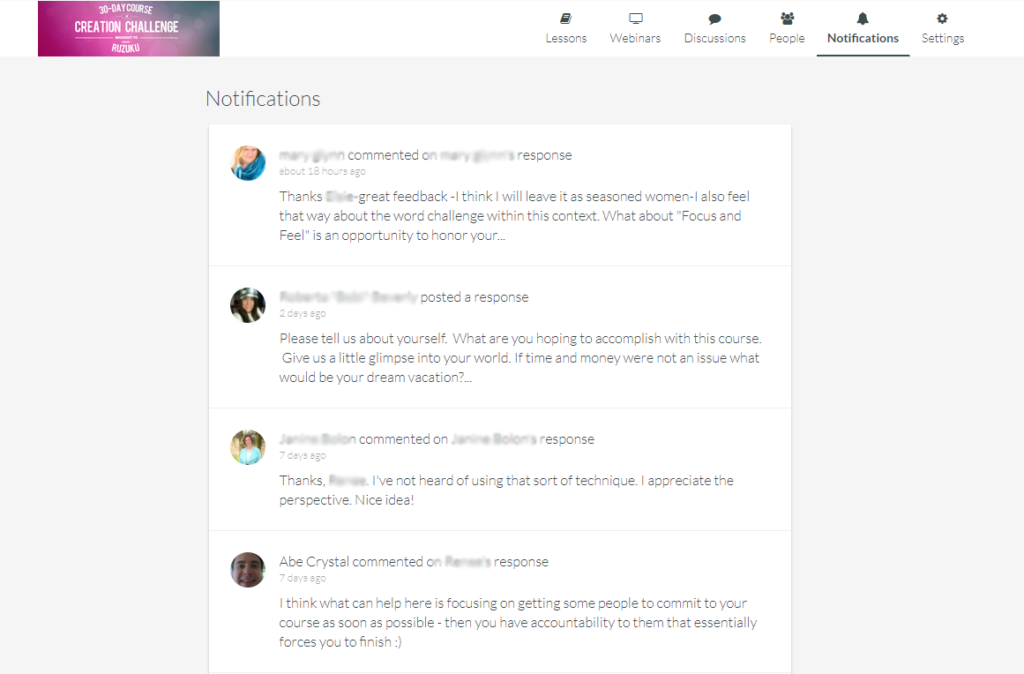
In addition, automatic email notifications keep participants engaged. For example, if Alice posts a comment and then Bob replies to her, Alice will receive an email notification.
Finally, Ruzuku can send daily and weekly emails to participants with summaries of the most recent posts and comments in the course. These emails help remind people to return and contribute to the course discussion, making for a more vibrant online discussion and community.
Kajabi includes limited support for discussion. Participants can leave “comments” underneath a specific piece of content, such as a video in the course.
Limitations of this model include:
- inability to share documents, images, or videos in the discussion
- lack of a “recent activity” page or “news feed” to see what’s new in the community
- inability to track and view how active different participants are in the community
In addition, as Forest Linden points out, students are unlikely to stay engaged in a Kajabi-hosted discussion because of the lack of email notifications:
In Kajabi, members aren’t notified of comment replies that you or your team post on individual post pages.
Those pages are where you post the individual lessons that make up your online program, and again, it’s common to turn on the commenting feature for post pages so that people can ask questions about a specific lesson.
People can turn on the email notifications for comment replies in their profile settings, but they are not enabled by default.
This creates situations where your paying members think you’re not responding to their questions, which can make them upset.
You can instruct people to enable the email notification settings in the welcome email they get right after joining your program, but still, some people will miss those instructions and not enable them.
Progress Tracking
Ruzuku’s “Course Progress” feature gives instructors insight into how students are progressing and interacting in the course.
You can view analytics for the course as a whole, or drill down and view data for a specific step in your course. You can use information found in Course Progress to help determine who is staying on track, and who might need a little more encouragement.
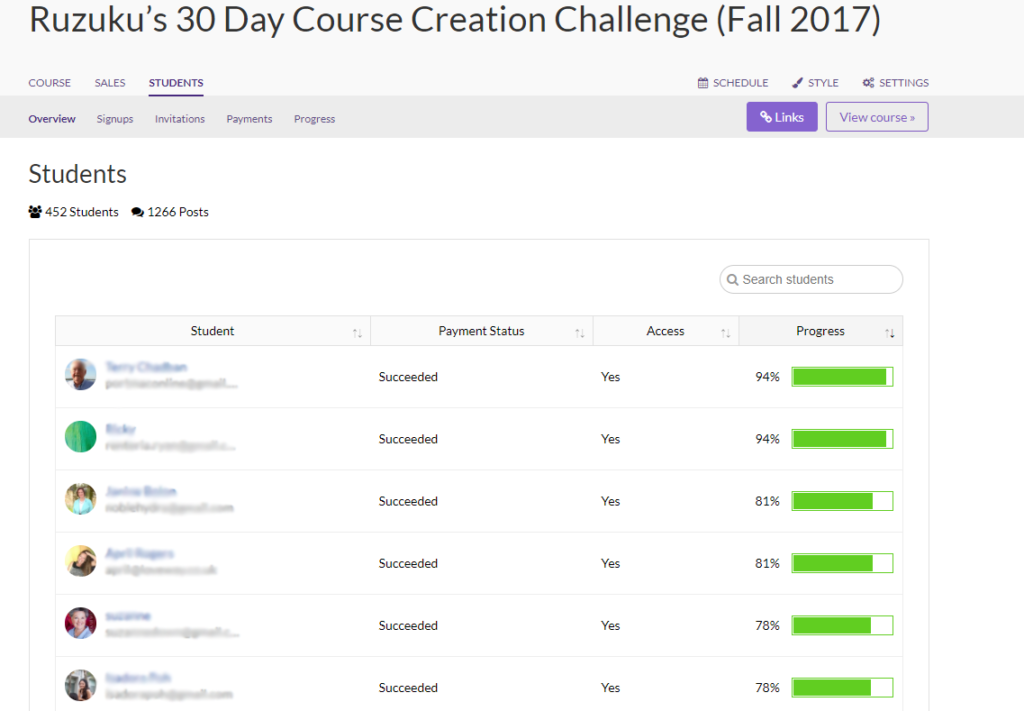
You can also download a spreadsheet of video viewing activity in a course, including which participants have viewed specific videos and what percentage of the video they have viewed.
Kajabi includes a “member progress” view which shows what videos a particular person has watched. However, there is no overall view into engagement and progress completion across an entire course.
Live Calls or Webinars with Recording
Live calls or webinars are a critical component for many online courses.
This is especially true with group coaching programs. The ability to meet in a “live” setting and share progress is what keeps your participants on track and motivated.
Ruzuku offers two forms of live events and interaction:
- teleconferences with slide presentations and group chat
- video webinars with slide presentations and group chat
You can easily create an event and run these live events directly through Ruzuku without having to purchase or learn an external service:
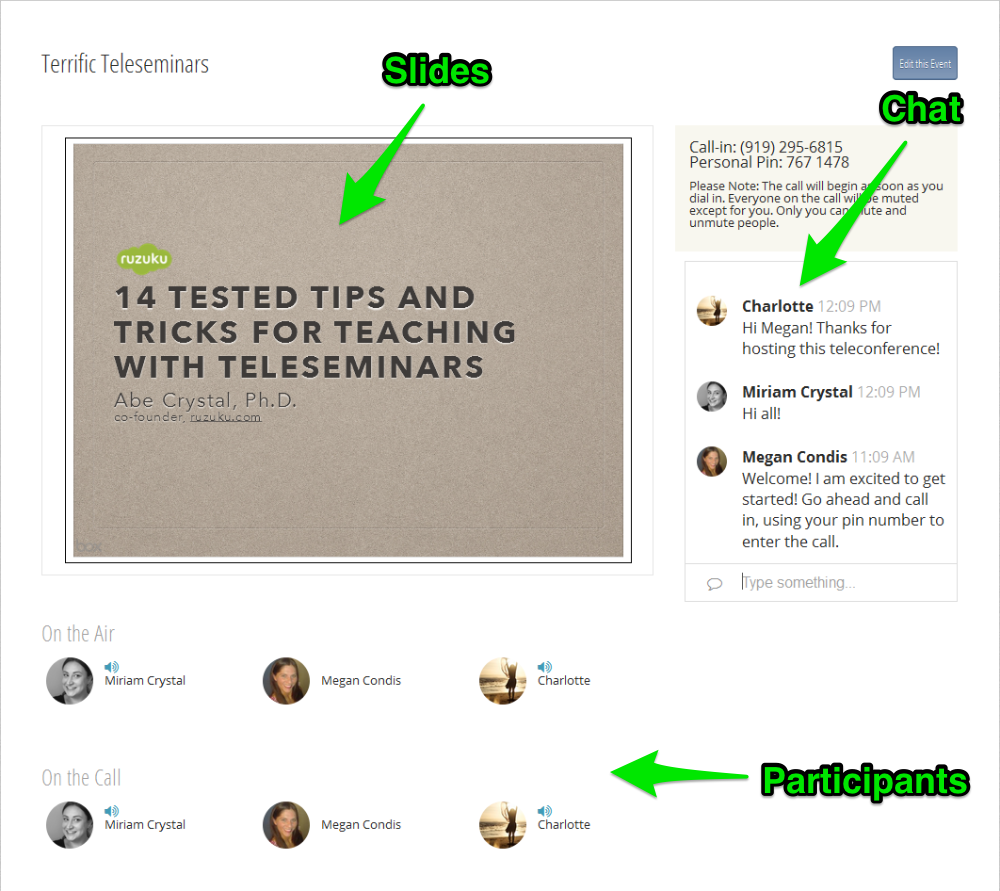
When someone includes a question mark with their comment, their chat will be highlighted automatically:

Teleconferences and webinars can be recorded automatically for later access.
Kajabi does not currently offer any conferencing or webinar features.
Pricing
Kajabi offers subscriptions ranging from $129/month to $899/month. Complete Kajabi pricing can be found here: Kajabi Pricing »
Kajabi’s plans limit the number of “products” (courses or offerings) you can publish, based on your account. For example, on the entry-level “Basic” tier you are limited to 5 courses or products.
Ruzuku’s plans start at $74/month (pre-paid annually). View Ruzuku’s pricing here: Ruzuku Pricing »
Ruzuku allows unlimited participants and courses with any paid subscription.
How to choose the right platform for you
Use our visual decision guide (below) to help you choose the right platform for your needs. Here are some considerations to take into account…
First, review what types of online courses/programs you plan to offer.
Are you intending to offer “live,” scheduled courses? For example, a 6-week course that starts on a specific date, with a group of people all going through the course together.
Do you also want to offer “On Demand” courses that are always available for registration?
Ruzuku supports both models.
Next, review what types of live events and interaction you’d like to have within your programs.
Do you want to offer group conference calls or video webinars as part of a course? Ruzuku integrates these types of live events directly into your courses. With Kajabi, you would research and purchase a separate conferencing and/or webinar system.
Finally, test out each platform by participating in a sample program and creating a test program of your own.
Ruzuku provides free, sample courses you can join:
… as well as a 14-day free trial (no credit card required for sign up).
Kajabi also offers a 14-day free trial to evaluate the platform.
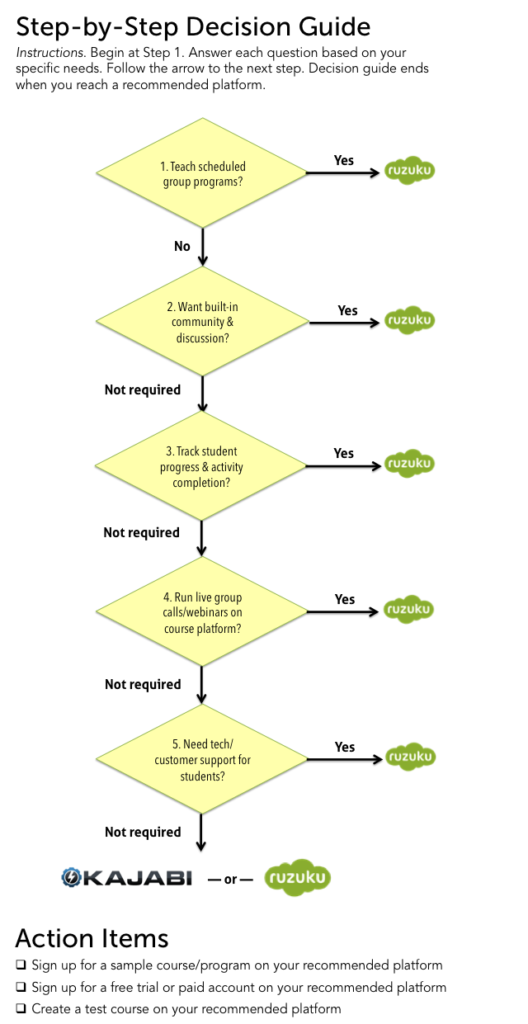
Your Next Step: Start a Free Trial
We hope this comparison guide has been helpful to you so far!
Now it’s your turn.
To sign up for your free, zero-risk trial (no credit card required), just click here.
Start your 14 day unlimited-use free trial of Ruzuku
Give Ruzuku a spin. And let us know what questions you have – we love to help!
| Ruzuku vs. Kajabi: Complete Feature Comparison | |||
| Category / Feature | Kajabi | Ruzuku | |
| Platform category | Managed (cloud) service, hosted on Kajabi.com. | Managed (cloud) service, hosted on ruzuku.com. | |
| Technical knowledge required | No specific technical knowledge is assumed. | No specific technical knowledge is assumed. | |
| Registration & Payment | |||
| Charge for course access (single payment) |  |  | |
| Charge for subscriptions to course access (recurring/continuous payments) |  |  | |
| Create free ($0) courses |  |  | |
| Invite or remove participants from courses |  |  | |
| Coupon codes/discounts |  |  | |
| Supported payment processors | Direct integration: Stripe. Other processors supported via link/redirect. | Direct integration: PayPal, Stripe. Other processors supported via link/redirect. | |
| Supported email marketing providers | MailChimp, InfusionSoft, 1ShoppingCart, and others. | MailChimp | |
| Scheduling and Content Delivery | |||
| Live (scheduled calendar-based) courses with automatic email notifications |  |  | |
| Copy a previous course and run it again on a new schedule |  |  | |
| Self-study courses |  |  | |
| Self-study courses with drip content |  |  | |
| Audio and Video: Hosting & Streaming Content | |||
| Host and stream video |  |  | |
| Host and stream audio |  |  | |
| Global Content Delivery Network (CDN) for fast audio & video delivery |  |  | |
| Word documents |  (as a link/attachment) (as a link/attachment) |  (can be displayed directly in the web browser for students to view easily) (can be displayed directly in the web browser for students to view easily) | |
| PDF documents |  (as a link/attachment) (as a link/attachment) |  (can be displayed directly in the web browser for students to view easily) (can be displayed directly in the web browser for students to view easily) | |
| PowerPoint slides |  (as a link/attachment) (as a link/attachment) |  (can be displayed directly in the web browser for students to view easily) (can be displayed directly in the web browser for students to view easily) | |
| Learning Community and Discussion Forum | |||
| Students have social profiles, bios, and photos in the course community | ✘ |  | |
| Discussion questions/prompts for specific activities/content | ✘ |  | |
| Students can post images, PDFs, and videos in their responses | ✘ |  | |
| General course-wide Q&A and forum |  |  | |
| Receive email notifications when a student posts a question |  |  | |
| Send email announcements to all participants in course |  |  | |
| Participants receive daily/weekly email updates to keep them engaged | ✘ |  | |
| Progress Tracking | |||
| Students can mark each activity as complete, and track their own progress |  |  | |
| Course Progress feature shows students’ activity completion and comment rates, with data for the whole course or by lesson | ✘ |  | |
| Live Calls or Webinars with Recording | |||
| Host teleconferences with slides, group chat, and automatic recording | ✘ |  | |
| Host video broadcasts with slides, group chat, and automatic recording | ✘ |  | |
| Customer Service & Support | |||
| Instructor support (supporting you as you create and run your courses) | |||
| Phone/Skype | ✘ |  | |
 |  | ||
| Private Facebook group |  |  | |
| Searchable FAQ/knowledge base |  |  | |
| “101” online training course |  |  | |
| Tutorial videos |  |  | |
| Student/participant support (supporting your participants as they register, pay, and access your courses) | |||
| Phone/Skype | ✘ |  | |
| ✘ |  | ||
| Searchable FAQ/knowledge base | ✘ |  | |
| Tutorial videos | ✘ |  | |
| Pricing | |||
| Free trial (no credit card required to sign up & try the platform) | 14 days free | 14 days free | |
| Initial setup fee | free | free | |
| Ongoing hosting/support fee | $129 – $899/month | Starts at $74/month (pre-paid annually) | |
Ready to try Ruzuku?
We hope this comparison guide was useful to you.
Now it’s your turn.
To sign up for your free, no-risk trial (no credit card required), just click here.
Start your 14 day unlimited-use free trial of Ruzuku
Give Ruzuku a spin. And let us know what questions you have – we love to help!

